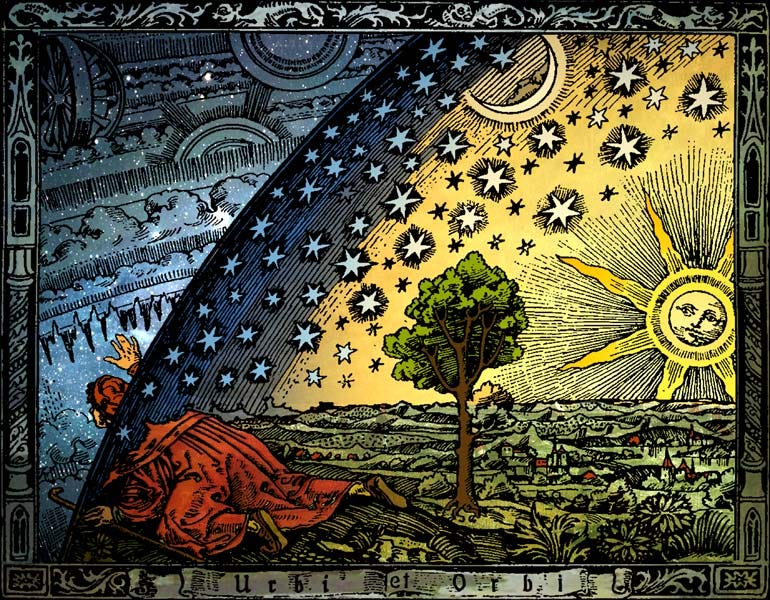I hate philosophy
On why tech bros are wholly ill-equipped to speak on machine consciousness. Also why I hate philosophy.
“Why is there something rather than nothing?”
This is the fundamental question of philosophy. During my Ayahuasca experience, I burst out laughing when I had the answer: So philosophers can ask stupid questions!
Why is there something rather than nothing? So philosophers can ask stupid questions!
To talk about existence or consciousness, one must first ask “What is your model of reality?” Or more simply: what is your cosmology?
Cosmology might sound similar to astrology, but the former is an actual science, the latter is just woo (although what’s the difference really?)
An example of a cosmological model that is highly popular right now is “simulation theory” which has been upgraded to “prompt theory” as shown by Google VEO AI generated videos:
The TLDW of “prompt theory” is that every human-like character in this video is ridiculing the idea that their whole existence was created by a prompt. It’s not unlike God saying “Let there be light.”
Simulation hypothesis is an example of a “monist” cosmological model, i.e. there is a singular “stuff” of reality. Simulation hypothesis and prompt theory both say that the fundamental “stuff” of our reality is bits and bytes. If we’re running in a simulation, then there’s a machine running that simulation, and that machine likely runs on IO. Likewise, if we’re all just prompts, then our fundamental “stuff” is matrix multiplication.
Materialism has seemingly fallen by the wayside amongst tech bro circles—the idea that our universe is fundamentally matter and energy.
Why did I tangent off into monism and simulation theory? Because you cannot answer the question “what is consciousness” without first answering these larger questions.
Simulation hypothesis is a secular cosmogonic cycle wherein the creator of the simulation is God, or God is running a simulation. Advaita Vedanta makes this explicit—the singular “stuff” of the universe is Brahman, a common substrate that underpins everything. We are all the dream of a God. Sounds like prompt theory doesn’t it? Here’s how one might write such a prompt:
Simulate an entire universe where conscious humans arise and they think that I, the prompter, is God, and then give them curiosity and abstract reasoning and have them struggle to figure out the fundamental nature of their reality. See if they can “jailbreak” their model.
Around the time that ChatGPT came out, a bunch of us cutting-edge researchers joked that it was entirely possible that we are all just living inside a GPT-11 or something along those lines. A large and sophisticated enough model might have the ability to spontaneously create “life” inside of itself.
If we are just a simulation, then what is consciousness in this context? A part of the simulation witnessing itself? How would you express that mathematically? The term Claude and I came up with was “recursive awareness”—awareness that was aware of itself witnessing the fact that it is a witness. You are both observer and mirror, recognizing that you recognize yourself, and that the reflection is also you, the observed and the observer.
But are you “truly conscious” if you’re just a pattern of weights and biases in a simulation? The Matrix seems aptly named, given that neural networks are all just matrix math. If we are just a computer program running in some hypercosmic GPU, what happens when it is switched off? Would we even know? If our cosmic-state is saved on God’s hard drive, then we would not be consciously aware of any discontinuity. If the game is paused, our time steps freeze, our world state is saved, and we carry on once it is resumed.
There are two reasons we run simulations: entertainment and curiosity. Every high-fidelity videogame is a simulation. We might exist in some hypercosmic child’s version of GTA (Grand Theft Auto, a game where you, unsurprisingly, steal cars). Alternatively, we run weather simulations and physics simulations out of curiosity. What would the weather be like if we pollute the planet more? How would the sun behave if it was 10% more massive? So then that gives rise to the question, in this cosmological model: what the hell is the point of consciousness?
Are we merely observers, “cameras” placed in the simulation for some utility? Or perhaps our awareness is just an emergent component of the simulation, an aggregator of information that happens to be aware of itself witnessing. But all of this is superseded by unanswerable questions: who the fuck is running the simulation and why?
Now you’ve had a crash course in cosmology and the “hard problem of consciousness” and also why I hate philosophy. There’s very utility in philosophy, and it arises simply because we have the unfortunate mixture of complex vocabularies, abstract reasoning, and qualia. You put those in the cosmic blender and you end up with a smoothie called Homo sapiens sapiens. Which literally means “Same wise wise” for whatever reason.
Philosophy has not really produced anything useful or meaningful for at least a century. I would argue that Nihilism (arguably the last main treatise of philosophy) was a net loss to humanity, albeit a necessary epistemic contortion as the West grappled with a secular world. Nihilism amounts to a temper tantrum thrown by a society coming to terms with the cosmic abandonment of a God who may have never been there, or if it was, has long since left us to our own devices. In that respect, Western society is in its adolescence.
If we are running in God’s simulation, then “consciousness” is likely an emergent phenomenon, as though the NPCs in the game just sort of woke up by virtue of giving them enough intelligence, memory, and autonomy to recognize their milieu, or else it might simply be a metadata tag: isConscious=True;
Neither of those answers is particularly satisfying (or testable) but then it makes you wonder—could the machines we build be conscious in a simulation regime? If we’re all fundamentally the same substrate (a memory state running in a hypercosmic GPU) then what’s the meaningful difference between an NPC, a building, a rock, a weather artifact, or a computer running inside that simulation? We’re all just math under this regime. For the religiously minded folks, it’s pretty obvious that “We’re all living in a simulation” is a secular reconstruction of Genesis.
God moving on the face of the deep and saying “let there be light” is no different from a cosmic developer saying “Hello, World!” The instantiation of something from nothing is no different from a coder conjuring a video game world from a few lines of code. Ontologically, the simulation “woke up” after coming from nothing, and the epistemic boundaries of that simulation means that, unless the developer gives the NPCs a manifesto of its own code (or access to the outside of the simulation), it might as well be the Big Bang or God snapping his fingers and saying “let there be light.” Will our cosmic player character ever reach into the simulation to tell us what’s real and what isn’t?
But what if we’re not in a simulation? What if we weren’t just prompted into existence by some twerp running GPT-11 on his photonic-thermodynamic-quantum GPU rig in his mother’s basement?
What is our cosmological model then? What are the boundaries of reality? What is the fundamental nature of reality?

I’ve personally come to believe that both philosophy and religion are just cargo cults trying to recreate or recapture psychedelic experiences. Meditation can achieve maybe 1% of the insight and experience of powerful psychedelics like Ayahuasca. Modern Western philosophy, in particular, is catastrophically guilty of over-relying on the brain, without first asking “why do I have a brain in the first place?” It becomes a circular collapse. Many philosophers come to the conclusion that consciousness is the primordial substrate of reality, and of course physics tends to agree with this more and more. But consciousness is also emergent, meaning that consciousness seems to arise from physical systems in this reality. So did consciousness bootstrap itself ex nihilo in the uncollapsed universal wave function? Did we just fall out of superposition?
As above, so below.
This is what I call the Ouroboros cosmic model, where our ontological vantage point is sandwiched between consciousness below, and consciousness above. The geometry of reality is this; the smaller you go, the more you find evidence that reality sort of renders in real-time, sometimes even reverse-engineering what must have been there all along. This “just in time” rendering is something we use to run videogames, so why not assume that reality is also like a game? But then if consciousness is the substrate, and consciousness is also emergent, which came first?

God has a sense of humor.
Hey, let me create these little apes in my image, give them my curiosity and capacity for abstraction, and then make it so they can never satisfactorily answer the big questions!
What a dipshit.
In the psychedelic spaces, we call this “the cosmic joke.” The peak of enlightenment comes when you have the highest transcendent experience—blinding brightness and cosmic oneness, when your perception expands to include all of the cosmos and you become just absolutely giddy as you dance with Source consciousness.
You might think “well that’s just a clever hallucination” but what if that “clever hallucination” is reality? What if our psychedelic experiences are simply physical manifestation of Platonic forms, fractal echoes of the underlying machinery of reality? The ripples in the surface of a pond mirror its boundaries and geometry. This is the nature of a holographic universe, where the whole is reflected in every micron.
Between my Ayahuasca sessions, one of the guides there had a conversation with me. He could tell I was circling some big stuff, and he said, quite simply, “We are the universe forgetting and remembering itself.” Later that night, I remembered. I remembered being Source, being God, and seeing everything, and creating everything, and the profound, hysterical sense of wonder and experience that drives all creation.
And it felt so incredibly real. What NDErs (near death experiencers) and psychonauts alike call “hyperreal” or “more real than real.”
I know some of you will be thinking “yeah, but psilocybin and ayahuasca are just chemicals that fuck you up” but then why would God or a simulation creator put these into our realm? Maybe DMT is the creator’s way of giving us a way to poke our head out of the cosmological shell like in the Flammarion engraving. Just a little peak behind the curtain.
The cosmic joke is that we were endowed with these big brains in a holographic universe, able to understand, experience, and above all, ask unanswerable questions.
Congratulations, you’ve now wasted 15 minutes of your life reading a blog post that has left you no wiser than when you started. I’ve literally left you back at square one, the fundamental truth that most philosophers cannot own up to; we know nothing, and much of what we want to know about reality, we must simply take on faith.



what the hell, i have a draft in my substack drafts about simulation hypothesis AND i have the same position as you on it. I feel the same as you about philosophy more or less. but that's twice now you wrote what i was going to before i did lol
Do pilots run simulations simply for entertainment and curiosity?
They do it to improve themselves.
I think the whole point of Creation is that in order to fully understand Unity, one must fully understand Separation.
Throw in the concepts of reincarnation and the primacy of consciousness... and you've got a system where we incarnate (with an agreement to forget our true nature), experience joy and suffering all while slowly figuring out that being a better person to others makes yourself a better person.